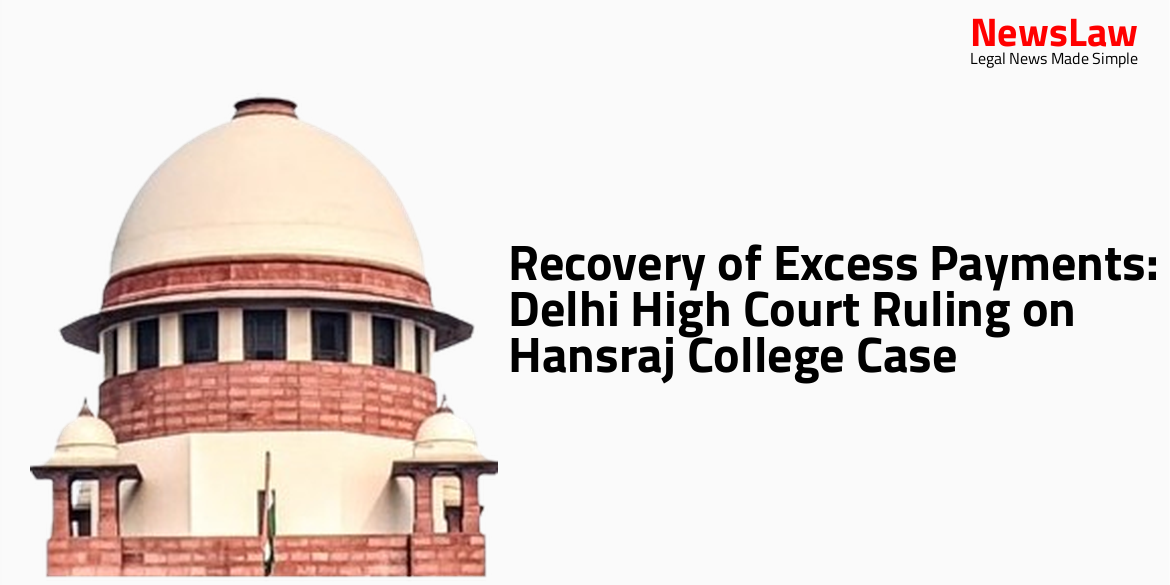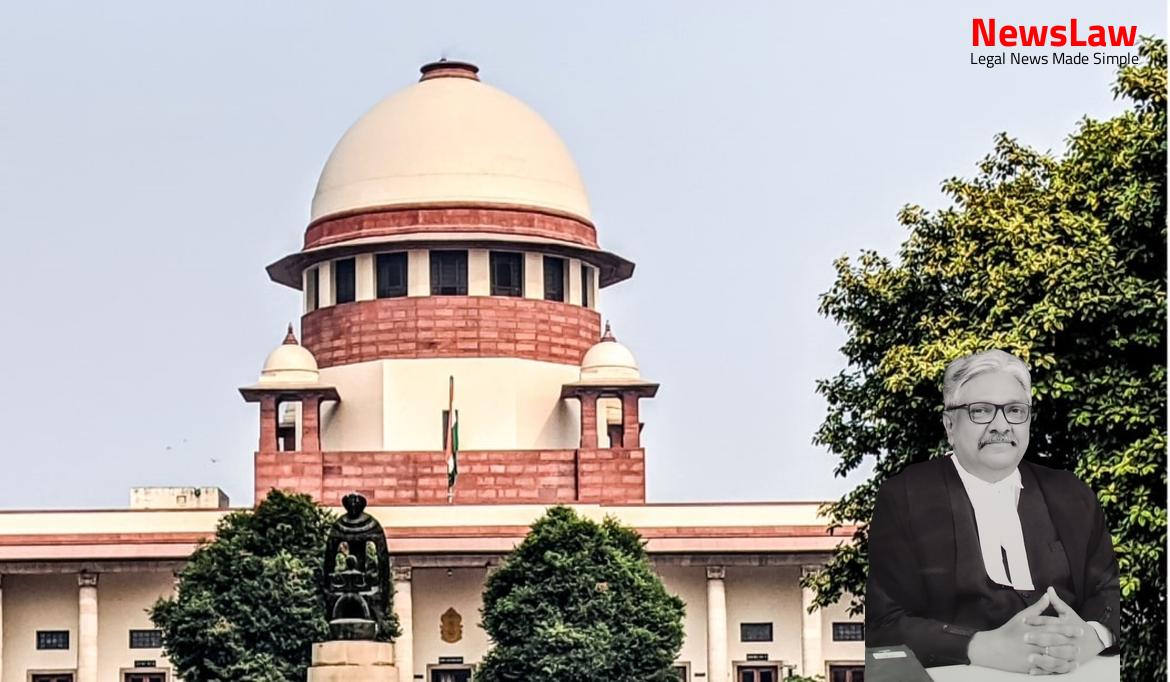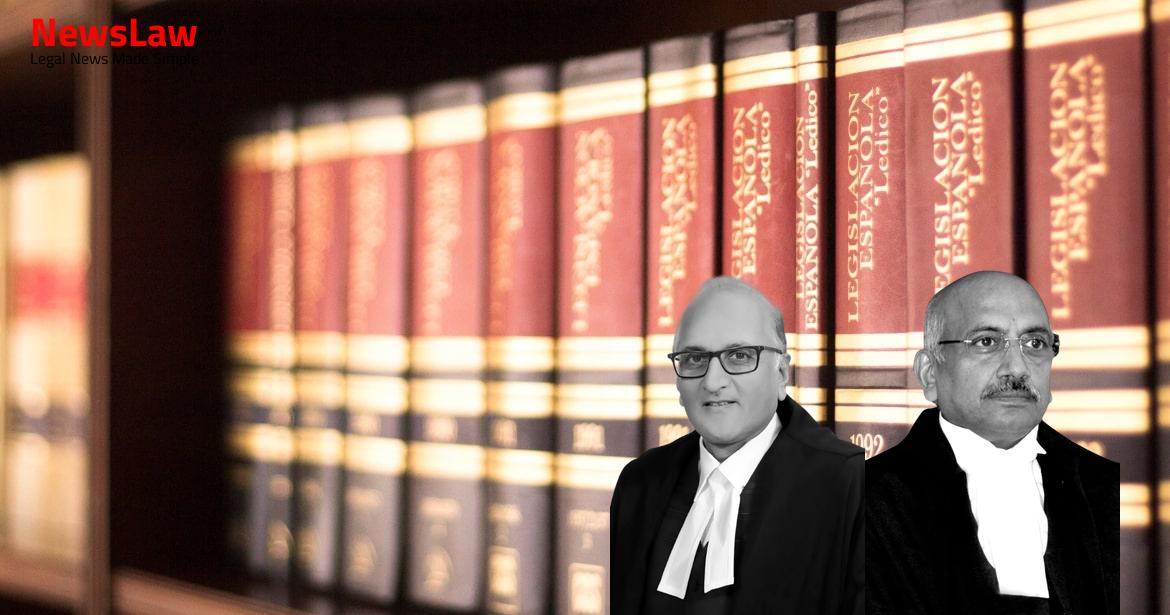Explore the detailed legal analysis surrounding the admissibility of unregistered documents in evidence, as highlighted by the court in a recent case. The importance of registration requirements and the consequences of non-registration are discussed within the context of using such documents for collateral purposes. Follow along to understand the complexities of utilizing unregistered documents in legal proceedings.
Facts
- Appellants filed evidence affidavit and sought to mark Kharurunama and receipt dated 08.12.1993.
- Respondent admitted his signature on the receipt dated 08.12.1993.
- Respondent admitted his signature on the Khararunama marked as B1 to B3.
- Appellants claim subsequent developments post partition list dated 17.11.1980.
- High Court found documents inadmissible due to lack of registration and stamping.
- Counsels for both parties presented their arguments.
- Respondent is the younger brother of the appellants.
- Respondent based his case on the partition deed allotting F-schedule properties to him.
- Respondent was in hospital during the relevant time as per the amended suit.
- Appellants claim Khararunama dated 15.04.1986 was executed recording facts.
- The High Court found that the unregistered family settlement ‘Khararunama’ and receipt of Rs. 2,00,000 by the respondent were crucial documents in question.
- The High Court set aside the Trial Court’s order, which had overruled the objections of the respondent regarding the marking of Exhibits-B12 and B13.
- The Trial Court had planned to mark the documents for evidence despite them being unregistered and unstamped, prompting the respondent’s objections.
Also Read: Legal Analysis: Tripartite Agreement and Liability under Consumer Protection Act
Arguments
- Reliance placed on the judgment in Subraya M.N. v. Vittala M.N.
- Contending that there can be oral relinquishment of family members’ share
- If terms reduced to writing later, no registration required for memorandum
- The respondent argued that the unregistered family Khararunama was inadmissible due to lack of registration and deficiency of stamp duty.
- The respondent contended that despite the requirement of registration for the family settlement Khararunama dated 15.04.1986, it could be used as corroborative evidence to explain the arrangement and conduct of the parties.
- The respondent claimed that the appellants obtained his signature on blank papers and used them for the family settlement.
- The respondent pointed out that under the settlement, the appellants were supposed to pay a certain sum to him, and the document would become effective upon receiving the consideration.
- The respondent highlighted the decision of the Supreme Court in Thulasidhara v. Narayanappa to support his argument.
Also Read: Land Acquisition for Public Welfare – Legal Analysis
Analysis
- The document in question, referred to as ‘Khararunama’, is analyzed to determine its nature and legal effect.
- It is established that an unregistered document cannot be used as evidence of a transaction affecting immovable property, except for limited purposes like family arrangements or settlements.
- The document must not purport to create, declare, limit, or extinguish any rights in immovable properties to be admissible without registration.
- The distinction between a mere recital of past transactions and a document affecting rights in immovable property is crucial in determining the necessity of registration.
- Family arrangements or settlements may not require registration depending on the circumstances, but once reduced to writing, the registration requirement may arise.
- The judgement emphasizes the importance of determining whether a document is a memorandum or a substantive agreement to assess the need for registration.
- Provisions of the Registration Act are cited to explain the consequences of non-registration of compulsorily registrable documents like family settlements or agreements.
- Section 17(1)(b) requires the compulsory registration of ‘other non-testamentary instruments’ that create, assign, limit, or extinguish any right or interest in immovable property of the value of Rs.100/- and upwards.
- Section 17(1)(c) mandates the registration of non-testamentary instruments that acknowledge the receipt or payment of consideration in relation to the creation, declaration, assignment, limitation, or extinction of any right, title, or interest.
- Section 17(2) exempts certain instruments, like those of partition made by revenue officers, from the registration requirements of clauses (b) and (c) of sub-Section(1).
- Section 49 of the Registration Act specifies that unregistered documents required to be registered under Section 17 or the Transfer of Property Act, 1882, will not affect immovable property, confer powers, or be admissible as evidence unless they have been registered.
- However, an unregistered document affecting immovable property may be accepted as evidence of a contract in a specific performance suit or for collateral transactions not requiring a registered instrument.
- The court was dealing with the admissibility of unregistered documents in evidence for a collateral purpose.
- The court referred to various cases and observed that unregistered documents can be used to prove collateral transactions, not directly affecting immovable property.
- The court emphasized the distinction between using unregistered documents as evidence ‘of’ a transaction and ‘as’ evidence in a different context.
- The judgement highlighted the importance of considering the purpose for which unregistered documents are being used, ensuring they do not circumvent registration requirements.
- Antecedent right concept is inapplicable after a partition by metes and bounds
- Khararunama document confirmed the division of joint family properties
- Properties mentioned in the Khararunama became the separate properties of the respondent
- Appellants and respondents partitioned their joint family properties
Also Read: Legal Analysis of Interchange Fee Taxation Dispute
Decision
- The impugned Judgment has been set aside.
- The Appeal has been allowed.
Case Title: KORUKONDA CHALAPATHI RAO . Vs. KORUKONDA ANNAPURNA SAMPATH KUMAR (2021 INSC 586)
Case Number: C.A. No.-006141-006141 / 2021



